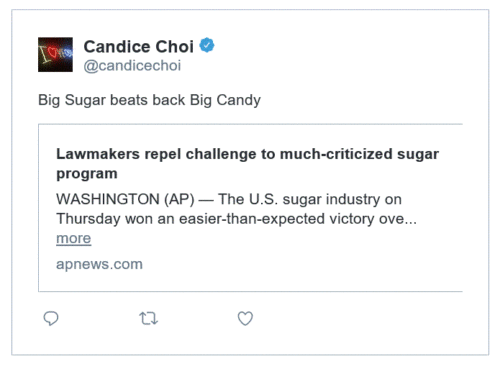Source https://www.foodpolitics.com/2018/05/sugar-policy-absurd-but-apparently-permanent/
The House version of the farm bill is in a mess right now and there is much to say about both its process (highly politicized) and content (thoughtless, mean-spirited, and just plain nasty). I will be singling out specific pieces for comment every now and then.
Let’s start with a proposed amendment that the House soundly defeated. AP reporter Candace Choi succinctly summarized the significance of this defeat: Big Sugar beats back Big Candy.
I’ve discussed our absurd Big Sugar policy in previous posts.
For decades, despite endless reform attempts, U.S. sugar policy has protected the interests of producers of sugar cane and sugar beets.
Basically, current policy maintains the price of domestic sugar at a level higher than the market price in order to protect politically powerful sugar cane growers in Louisiana and Florida, and somewhat less powerful—but far more numerous—growers of sugar beets.
American consumers pay more for sugar, but only an average of $10 per capita per year, not enough to get people upset.
The big losers are candy makers and other …
Source https://www.foodpolitics.com/2018/05/sugar-policy-absurd-but-apparently-permanent/
The House version of the farm bill is in a mess right now and there is much to say about both its process (highly politicized) and content (thoughtless, mean-spirited, and just plain nasty). I will be singling out specific pieces for comment every now and then.
Let’s start with a proposed amendment that the House soundly defeated. AP reporter Candace Choi succinctly summarized the significance of this defeat: Big Sugar beats back Big Candy.
I’ve discussed our absurd Big Sugar policy in previous posts.
For decades, despite endless reform attempts, U.S. sugar policy has protected the interests of producers of sugar cane and sugar beets.
Basically, current policy maintains the price of domestic sugar at a level higher than the market price in order to protect politically powerful sugar cane growers in Louisiana and Florida, and somewhat less powerful—but far more numerous—growers of sugar beets.
American consumers pay more for sugar, but only an average of $10 per capita per year, not enough to get people upset.
The big losers are candy makers and other …
What Do You Think?
comments
